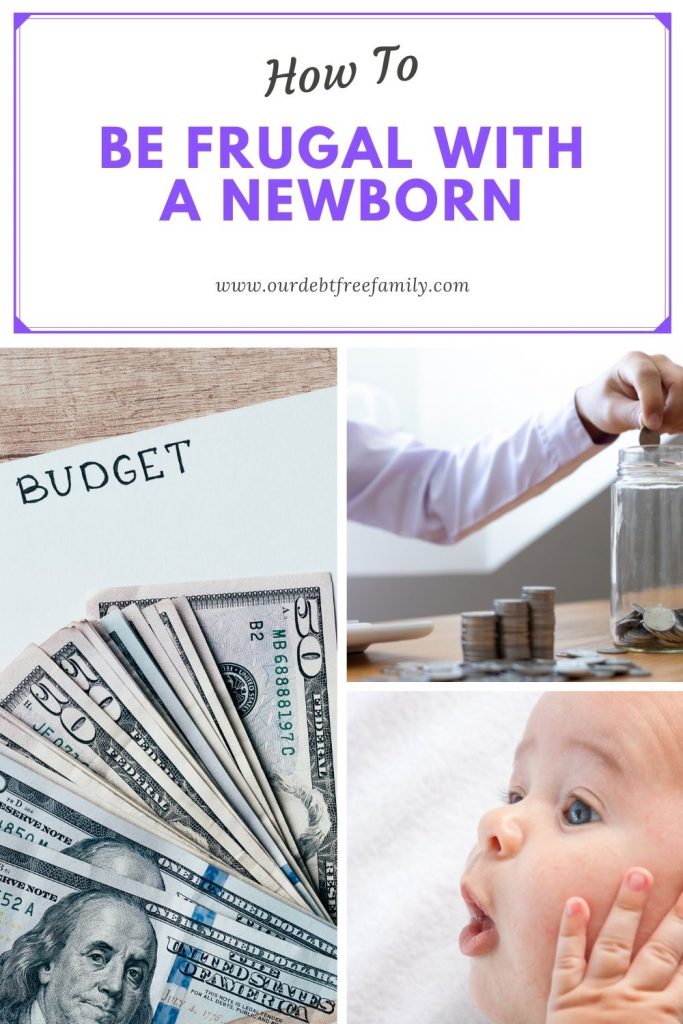Are you struggling to make your budget work but keep coming up short?
If your budget isn’t working, you might think that you’re just not trying hard enough to stick to it. But I don’t think that’s always the case.
Commit. Plan. Take action.
Are you struggling to make your budget work but keep coming up short?
If your budget isn’t working, you might think that you’re just not trying hard enough to stick to it. But I don’t think that’s always the case.

There is no doubt that having a baby absolutely changes your life. It is a challenge to adjust to such a huge change and maintain progress on financial goals, let alone stay on budget. Needless to say, our monthly budget has been looking rather neglected and ignored recently. This has led us to look for ways to be frugal with a newborn and make the most of our money.
The biggest cost for our family since having a baby has been food. Sometimes you are just too exhausted to cook. So, we wind up ordering food or hitting the drive thru so that I can continue working or tend to a crying child. It’s understandable and we’ve tried to not be too hard on ourselves for it. But it is money wasted and that will always bother me.
That being said, it is possible to be frugal with a newborn. You simply need to find where your problems areas are and focus on improving there to be successful at it. Here’s how…
There are a few steps you need to take to being able to be frugal with a newborn. Frugality is more than just looking for the best deal or pinching pennies. You have to consider long-term wear items and contributing financial factors.
These are just a few things we’ve discussed that will help us be more frugal with our newborn and stay on track. What are some of the ways you have saved money with children?

Inflation is hitting everybody hard this year. Prices are through the roof. In fact, the price of turkey alone has gone up 23% in the last year. Eggs? 35%. So, getting together for large meals with all the traditional foods may be a bit more difficult this year. Here is how it will impact our holiday plans.
While many government officials have been hesitant to use words like “recession” and “inflation” when speaking about the United States economy, everyone is feeling it.
@districtmediafinance Thanksgiving dinner is looking a lot more expensive this year. #greensbeanspotatoestomatoes #thanksgiving #savingmoney ♬ GREENS BEANS POTATOES – DJ Suede the Remix God
Though the upbeat song in the video above makes you feel a little less anxious about it, the rise in cost of everyday essentials is crippling some families in the U.S. When it comes to celebrating the holidays this year, things are looking very different. People are swapping out their big turkey dinners for something a little cheaper. In some cases, they may choose to skip the big gathering altogether.
Here is how inflation is impacting our holiday plans.
This year, we aren’t going to be doing any extensive travel around the holidays. That is the biggest change that will be happening. However, we are also making some changes to our typical menu for Christmas.
Our family typically does a turkey and a ham on Christmas. This year, I am hosting the holiday gathering at my house. We are likely going to only do one main course protein. Sides and other items will be decreased this year as well. After all, it is only one meal. How much do you spend on your weekly dinners?
As mentioned in a previous blog post, household debt is at an all-time high in the U.S. For people like us trying to avoid racking up credit card and loan debt, this is simply not an option. How do you still enjoy the season without breaking the bank?
How is your family dealing with inflation around the holidays this year? Let me know your tips and tricks in the comments.

As the holiday season ramps up, I’ve been doing a lot of reflecting. Just six years ago, my husband (then boyfriend) and I were living in a motel, getting ready to spend Christmas homeless. No Christmas tree. No gifts. We had two plates, two cups, two of each eating utensil, one pot, one pan.
Now, it seems easy to go overboard during the holidays. While we aren’t rich, by any means, we are able to buy each other nice gifts and truly enjoy the season of giving. However, I want to practice more mindful spending as we enter the hustle-and-bustle of the end of the year.
Mindful spending is more than knowing where your money goes. Satisfied Spending defines mindful spending as, “lifestyle-based money management.” When you practice mindful spending, you are bringing awareness to how you act, think, and feel about money. This helps you create a more sustainable money management plan for yourself because you are getting to the root of your attitude and thoughts toward finance.
Some of the main benefits of mindful spending include:
While I try to practice mindful spending all year long, it especially comes in hand at Christmas time. I am someone who loves giving gifts. It’s something that brings a lot of joy to my heart. So, at this time of year, the budget has to include gifts, but each gift is well thought out, researched, and I look for good deals. How can you check with yourself and be sure you’re being more mindful with your spending?
It’s easy to go overboard at Christmas time, especially if you have children. I am currently squashing the desire to buy my little girl everything on her Amazon wish list (which I created for her).
At the same time, household debt is at an all-time high in the United States. If you want to avoid additional credit card debt or loans, you should trying to be more mindful about your spending. Here are questions to ask yourself before making a purchase.
Of course, gift buying and celebrations make it hard to truly assess every purchase you make this time of year. Asking yourself these questions should help though.
Readers, how do you practice mindful spending during the holidays and throughout the rest of the year? Let me know your thoughts in the comments.

You may have noticed it says “to save money on home entertainment.” While entertainment costs usually occur outside of the home, if you truly want to save cash you’ll want to stay home and have fun (though there are a few here that involve going out). Going out costs more because you pay extra to have someone making your food, and you pay for ambiance as well as convenience. Staying at home is really the way to go.
That being said, here are ten great ways to save on home entertainment:
Netflix became a great way to save on home entertainment years ago. Before Redbox gained a ton of popularity, Netflix began a monthly DVD mailing subscription. You received a DVD in the mail for your monthly price and once you returned it, you’d receive the next movie on your list. Slowly but surely, Netflix turned into the giant entertainment source it is today. Overall, it is still a great way to keep your home entertainment costs low (especially if it is the only streaming site you subscribe to).
Amazon Prime is another great way to trim the cost of home entertainment. Many people use Amazon’s video services to replace their current television services. This can save you hundreds of dollars a month if your cable bill was steep enough. Prime offers tons of television and movie options as well as the option to purchase individual channels, like HBO and Showtime, if you desire to do so. If you’d like to watch a new movie, you can rent it through Amazon. You’ll also get free shipping on many items and other great Amazon Prime perks. You can purchase Amazon Prime services for $99 per year.
Another great way to trim the cost of home entertainment is joining Sling TV. Sling TV prides itself on being “a la carte” television where you choose what channels you want. Packages start at $20 a month for basic live television. This includes many of the regular television channels you receive with basic cable at a much cheaper price. The more channels you add to your package, the higher the price will be. However, Sling TV can save you a ton of money, especially if you’re switching from traditional cable.
This doesn’t necessarily pertain to “home entertainment” but you can save a ton of money on monthly entertainment costs by considering a Movie Pass. If you’re an avid moviegoer, Movie Pass may be a perfect option. For $9.99 a month you can attend unlimited movies at various theaters throughout the United States. Of course, you’ll want to be sure that there is a theater near you that accepts the Movie Pass. If they do, you’ll save a ton on going to the movies.
When most people think about skipping the movies, they think Redbox. However, Redbox can actually cost you more money than it saves you. Sure, it’s only $1 and some change to rent the movie for one night. More often than not, you keep the movie for multiple days or until you have a chance to drop it off again. This usually winds up costing you $5 or more (up to $35 if you keep it out long enough). Skip Redbox and rent movies online, through Amazon or YouTube.
Whether you decide to take these tips on how to save money on home entertainment or find new ways to save for your home, discovering ways to trim your budget and save is always great!
You may also enjoy this article on Free Home-Based Workout Videos.

There is no doubt we’ve made strides in the right direction as far as our finances are concerned. However, there is still one area in which we are failing: planning for unexpected expenses.
This week I got the bridesmaid dress for an upcoming wedding in the mail (two weeks out from the wedding) and my worst nightmare occurred. It didn’t fit! It was far too late to return it for the correct size, so I decided to take it to a local alterations place. The total for the changes needed came out to $250.
The price definitely threw me for a loop and, because we aren’t using credit cards, it came directly out of savings. I was frustrated with myself for not planning ahead for alterations costs.
Planning for unexpected expenses is key to becoming debt-free. If we weren’t so devoted to not swiping our credit cards, I could have easily racked up another $250 in debt without batting an eye. The same is true for other expenses that may come your way out of the blue.
Failing to prepare for this is can lead to you hindering your debt progress. Not to mention, it can have an impact on your emergency savings and take away from paying off your debts. It can also put a dent in your emergency savings. Then you have to readjust your finances to refocus on padding your savings accounts once again instead of using the money for my debts.
Thankfully, there are things you can do to plan for the unexpected things in life. Here are a few tips to help you avoid the mistake I’ve made.
First, identify your unexpected expenses. Of course, we can’t always see into the future, but if there’s something that comes up with some regularity, you can try to plan ahead for it. For instance, property taxes, medical expenses, birthdays and holidays, and car repairs can all be planned for.
To identify other unexpected expenses, you can take a look at the past year’s bank and credit card statements. Note any irregular purchases and try to budget for that. You can add up the total of all the expenses and then divide it by 52 weeks. Set aside that amount every week moving forward. This can help you have the money set aside when something unexpected comes up.
Doing this will help you plan ahead and (unlike me) have the cash set aside when something may pop up. Do you have any additional tips you’d add? Leave them in the comments below!
Budgeting can be a huge pain, especially if it seems like you are constantly revisiting it. I feel like we are constantly examining our budget for places to trim and save more money. Even if you’re not in the midst of a financial crisis, you should review your budget on a regular basis to make sure you’re accounting for changes and saving as much as possible. So, how often should you review your budget?

Before we get into the periodicity of budget review, the most important time to review your budget is when there are uncontrollable economic changes that will affect your spending power. We are in unprecedented financial times where inflation can eat away at your income without notice. If you’re waiting for your periodic budget review to catch the impact of economic changes, you may be heading for increased debt.
You should absolutely take a look at your budget whenever there is a major change in your personal financial situation. So, you’ll want to review your budget when you’ve gotten a raise, lost income, or paid off debt. If there’s a major change in cash flow, you’ll likely need to make major changes to your budget which may be for the better. For individuals with a bit more disposable income, you’ll want to increase your savings and retirement investments. Consider opening a Webull account where you can invest for free. They even offer an IRA options and a wide variety of research tools to for beginners to reduce risk.
If you have lost income due to a pay cut, working less hours, or encountered a period of unemployment, you’ll want to trim unnecessary costs immediately in order to save money. Having liquid savings is crucial in debt reduction as it prevents us from falling into the hands of predatory lenders. First comes debt, and then goes your credit. The latter leads to even more debt.
We are currently looking at our budget on a monthly basis because we need to identify places to trim constantly. Many others take a look at their budget on a monthly basis as well, especially if they are attempting to pay off debt. The best time to do this is generally at the end of the month. Take a look at the previous month’s budget and determine how well it worked for you and your family. Adjust certain aspects of your budget as needed. Here are 3 printable debt free charts to help track your budget.
Another great way to review your budget is quarterly. Many of us make financial goals at the beginning of the year. Revisiting those goals, and your budget, every three months can help you stay on track. It can also help you review where you may be able to trim costs on a larger scale. For instance, if you notice you’re spending a lot on entertainment the first quarter of the year, you can make a concentrated effort to scale back in the second quarter.
You should always take a look at your budget at the 6-month mark of the year. Did you make financial promises to yourself as a New Year’s resolution? Budgeting and better financial management are on the country’s the top 10 list of New Year’s resolutions. You’re at the halfway mark and this is the time to see how well you’ve been budgeting for the first half of the year. Another benefit to a midyear budget review is acknowledging the incoming heavy spending periods; summer vacation, back-to-school, Thanksgiving, and Christmas. If you have never conducted a personal midyear budget review, here is a great article on how to conduct a midyear budget review.
Some people thrive on an annual budget and only review it throughout the year if there is a major change in their finances. For me, this simply wouldn’t work, but if you are already debt-free and have a great savings plan in place, an annual budget review may work for you. Consider investing in dividend paying stocks. However, keep in my that even the most profitable companies in the world conduct at least quarterly budget reviews. A lot can happen in the span of 12 months. You may be missing out on opportunities if you fail to identify budget challenges or additional savings and investment potential early on.
If you’ve ever asked yourself how often should you review your budget, you’re not alone. It is a question I’ve struggled with occasionally. Keeping constant tabs on your finances can be exhausting but the financial freedom it can lead to is motivating! Budgeting is never a once size fits all situation so I suggest you try starting with a monthly budget review then decrease the frequency depending on your budget spending and income variations.
Readers, how often do you review your budget?

There are a number of budgeting methods out there. Thankfully, you can always cater your budget to what your current needs are. For the most part, people find it easiest to set up their budget around when they get paid. Because many people get paid bi-weekly, the bi-weekly budget set up is the most common. Here’s how to set one up.
When it comes down to it, there are five different types of budgeting methods to choose from. Depending on where you are in your personal financial journey, each has its perks.
So, how do you set up a bi-weekly budget?
Depending on your own personal needs, a bi-weekly budget may not work for you. You may benefit from a weekly or monthly setup more than bi-weekly, especially if you get paid more (or less) often. For us, we have our main income come in every two weeks and we set up a zero-based budget to make the most of those paychecks. Here’s how we set it up…
The last item in setting up a bi-weekly budget is possibly the most important. You have to choose a budgeting method that will work for you. Track your spending and get familiar with your finances. Doing this will ensure you are being realistic in your expectations. Similarly, if you are paid on a weekly or monthly basis, a bi-weekly system may not be the best option for you. Take all of your personal needs, financial goals, and expenses into account to find the best budgeting method for you.
Readers, what budgeting method do you use?

There is no secret that becoming debt free requires a fair amount of focus and determination. Sometimes it can seem like the entire universe is against you getting back on track or paying off your loan, credit card, whatever it may be. Here is how I’m able to re-center and find my financial focus after a setback.
If you’ve been following our family for the past couple of years, you know I am no stranger to setbacks. After living in a motel for six months, getting into our apartment, racking up some debt, and losing one of our incomes for six months, you think I’d be ready for just about anything, right?
In the midst of wedding planning and my regular busy schedule, I got intensely ill in January and it really set me back. First, I was ill with the flu and then I was in the hospital for possible appendicitis (yikes). Then, when I returned to work I got a notification that the state would be garnishing my wages for my 2017 back taxes. I’d been attempting to work out a payment plan but didn’t owe much so they’ll be taking $460 a month until about May or June.
When this happened I spiraled a little bit. Forget the wedding, forget our savings plan, forget all of it. However, before I completely overreacted, I decided to take a step back and reset my financial focus.
Obviously, this isn’t the first time this has happened. Sometimes, it is hard to focus on the big picture when everything seems like it is going wrong. Because I have the tendency to overreact, I need a go-to list of things to do to recenter my personal financial focus.
Lastly, if you’re really struggling to manage your finances, consider speaking with a professional. There is no shame in reaching out for help if you need it. Some financial advisors will even offer up their services for free (or cheap) if you qualify.
Readers, how do you realigh your focus when it comes to your finances?